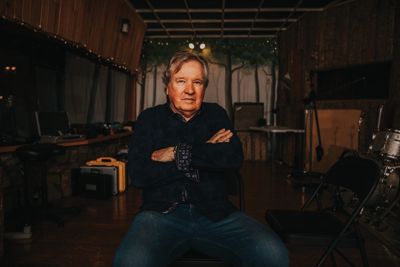
Buzz Cason
In early 1970, Buzz Cason opened Creative Workshop, the recording studio he’d always wanted in Nashville. The ’60s had flown by, pushed by The Beatles, blues, soul and Bob Dylan, and in the universe of Music City, Cason had helped shape the sound of the decade. Working with a group of now-legendary singers, musicians and songwriters, Cason created a pop utopia that reached beyond the physical and metaphorical borders of Nashville. Cason’s solo work stands the test of time, and he has made his mark as a producer, studio owner and filmmaker.
At 80 years old, Cason seems eternally young and ready to rock ’n’ roll, and he’s been keeping busy of late. In May, he released an album of pop songs, 2020, recorded with his sons Parker and Taylor Cason. In addition, he says he and his longtime friend Mac Gayden — himself a formidable guitarist and songwriter — are readying a new full-length, Come Along, for release this summer.
Meanwhile, Creative Workshop continues to thrive. With its history of pop and country hits that includes The Judds’ 1984 track “Why Not Me” and Carl Carlton’s 1974 rendition of Cason and Gayden’s song “Everlasting Love,” it’s one of the great Nashville recording studios.
As the continued success of Creative Workshop demonstrates, Cason is an adept businessman. But his history as a post-Beatles popster is just as fascinating. A superb all-rounder — Cason sings, writes, produces and plays guitar — he set out to succeed outside the confines of Nashville’s Music Row, an area only a few miles from Cason’s studio in Berry Hill.
“I just always had a wide spectrum of liking everything,” Cason tells me from a seat at Creative Workshop. “But we faced the harsh reality that we were in Nashville, and it was hard to get accepted. I say ‘we,’ which is me and Mac and the guys we were working with.”
James Elmore Cason was born in 1939 in Nashville. He learned to sing parts in church choirs, and became a devotee of Nashville DJs Gene Nobles and Bill “Hoss” Allen, who played R&B records on radio station WLAC. By 1960 he’d scored a hit, “Look for a Star,” under the name Garry Miles. He’d also gained road experience with Nashville group The Casuals, who began backing singer Brenda Lee in 1958.
After an early-’60s stint in Los Angeles working with producer Thomas “Snuff” Garrett at Liberty Records — where Garrett had extracted hits from the likes of Buddy Knox and Gary Lewis & the Playboys — Cason returned to Nashville in 1964. Not content to have produced Knox’s splendid 1963 single “Hitchhike Back to Georgia” in Nashville with guitarist Wayne Moss arranging, Cason co-wrote the very Brian Wilson-esque 1965 song “Sandy” for Ronny and the Daytonas, a Beach Boys-style group fronted by Nashville singer John Buck Wilkin.
Along the way, Cason had a hand in writing a pop standard, “Everlasting Love,” which first hit the charts via Robert Knight’s 1967 recording. It has since been cut by the aforementioned Carlton, as well as by The Love Affair and Gloria Estefan. In his producer’s role, he recorded Clifford Curry’s 1967 soul hit “She Shot a Hole in My Soul” at Moss’ Cinderella Sound Studio in Madison.
The pop side of Cason’s career merits its own compilation. His 1970 rendering of Dennis Linde’s “Funky Street Band (Play It Louder)” finds him exploring soul-rock. In the late ’60s he joined a group of fellow Nashville studio musicians to record pop pastiches for the low-budget Spar Records label. As part of a group called The Now Generation, Cason sang and played on tracks like 1969’s “Daytona Darlin’,” a weird, funny riff on Chuck Berry.
After cutting the first sessions at Creative Workshop on March 9, 1970, with Jimmy Buffett, Cason facilitated Buffett’s career by recording the future star’s first two albums, 1970’s Down to Earth and 1971’s High Lonesome Jubilee. The studio was renovated in 1976, and Parker Cason oversaw a 2017 update of the control room.
Cason’s latest music doesn’t tarnish his standing as a pop master. “Montana,” the opening track of 2020, is one of his best in years. Talking to Cason, I get the sense he’s still looking for a hit. As he tells me, making those hits takes work and, just maybe, a little rule-breaking — as in the time Leon Russell set up shop in the studio.
“Leon kept the video going the whole time. He was ahead of his time on video. And he kept the tapes running. We had stacks and stacks of 16-track tapes.”





